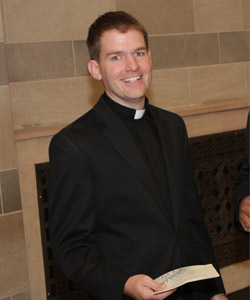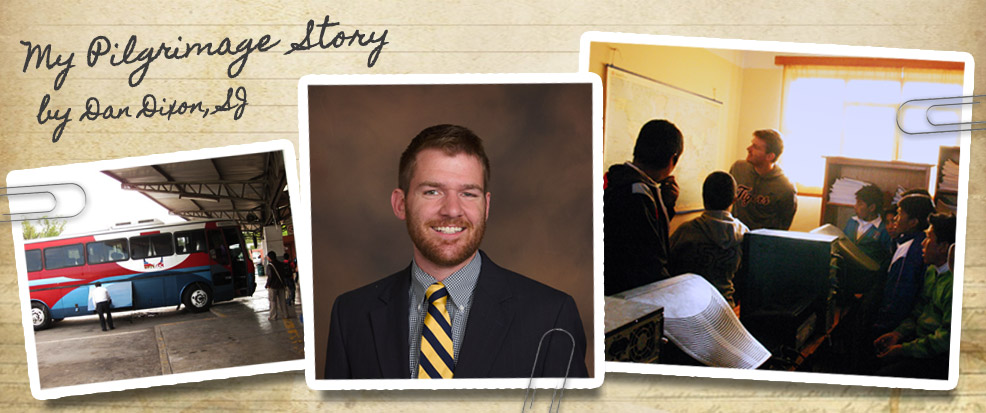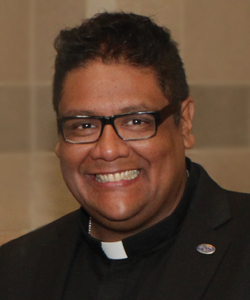
| Send a message of encouragement to Dan |
| Meet the 34 men who entered the Jesuits as novices this summer (pdf booklet) |
| Subscribe to our quarterly e-series "A Heart on Fire" |
| Learn More about Jesuit Formation |
|
|
“What’s going to happen to me? Where will I sleep? Will I be
kidnapped? Will people understand me? Will they even care to try?” - Dan Dixon, SJ
These pressing questions were raised by Jesuit seminarian Dan Dixon
in the summer of 2013 as he was preparing to embark on a month-long
pilgrimage with a one-way bus ticket and a meager $30 to cover his
travel expenses.
The pilgrimage is a spiritual journey and it is one of several
experiments a Jesuit encounters in the first of his 10 plus years of
education and training – a period we refer to as Jesuit formation and
one that prepares him for a life of service to others.
Dan is one of 93 Midwest Jesuits who are currently in some stage of
formation. Their deep love of God and passion for this world set them
on fire – a fire that kindles other fires.
Here is his pilgrimage story.

The Buildup
What’s going to happen to me? Where will I sleep? Will I be kidnapped? Will people understand me? Will they even care to try?This is a small sampling of the thoughts I had in the week leading up to pilgrimage, all the way through my two day bus trip between Minneapolis and Mexico City. I seriously contemplated getting off the bus in San Antonio, calling an audible on the pilgrimage I had been praying about for a month.
On the bus ride, I clung to my $30 like Linus to his blanket. I had packed a bag of peanuts and trail mix, which was all I ate those two days.
I was afraid.
The bus finally arrived at the Mexico City bus station at 5 am. I hadn’t slept for two days and was certainly not ready to speak to someone in Spanish. But, I needed to change my money into pesos to take the Metro to my initial destination, a parish across town. The casa de cambio didn’t open until 9am. This pilgrimage was going to be brutal.
I sat outside the bank, next to a homeless guy named Betuel, from a city called Oaxaca. After twenty minutes of nursing my wounds, I introduced myself. Turns out, he had been in the US with his family for five years, working in South Carolina. He had been deported the day before, with his wife and two year old son staying in the US in hopes for a better life for Francisco, his son.
Turns out, my wounds weren’t so bad after all.
We said our goodbyes, and I headed to my initial destination, a community of Jesuits in a poor neighborhood in the south of the D.F. (aka Mexico City). Their primary ministry was a parish, Resurrection.
Getting Accustomed to Community
The next day, I met a family in the parish who took me in for a few
days. I was accepted, without reservation, as a member of the family. I
learned that it’s good form to kiss the women you meet on both cheeks. I
learned that you never turn down food (it’s an insult). If you’re not
hungry, ask for un poquito (a little).
I also witnessed openness in the community. Though poor, there is a
connectedness among the neighbors. For example, I attended a funeral
with Josefina, la abuela (the grandmother) of the family. The service
was held in the home of the deceased woman, a mother with two boys, ages
eight and sixteen. People wept openly and loudly. I had never seen such
a thing. I asked Josefina if she knew the woman. “No, pero aqui la
gente es nuestro familia.” In Mexico, family is understood in a broader
context. To see so many support a fellow community member, even if not a
friend, was powerful for me.
The next day, Josefina and I visited las viejas, the elderly women
of the neighborhood. Again, they were not necessarily amigas de
Josefina, but she thought to bring them fruit and to visit them. With
some women, it was moving to see the strength and faith they brought to
their impending death. With others, I was frightened at the fear and
loneliness I saw.
Many of the women we visited asked me for a blessing. I tried to
explain, “No soy un sacerdote!” But to them, I was a man of God and they
wanted me to bless them. I would feel uncomfortable enough doing this
in English. In Spanish, what could I say? But this is what I was being
asked to do. The role of the priest is huge in Mexico. Priests are
constantly doing baptisms, quinceaneras, weddings, funerals. The people
want them present for everything.
There is a sense that the priests and religious in Mexico belong to la gente, the people, the community. This is how I fit in to the
community during my month of pilgrimage. I think this is very special.
So much attention is given to what priests “give up”, and not
enough to what they receive. The ability to be present at key moments in
people’s lives is special, a gift from God.
It was a grace to feel that I belonged to the people who asked for my prayers.
Conquering fear in Oaxaca
After Mexico City, I took a bus to Oaxaca, thanks to la limosna.
There, I became an active part of a parish, Concepcion Imaculada. I was
put to work immediately at a youth retreat, where I gave the first of
many talks. I love public speaking, but in a second language it can be
really frustrating.
Relying on myself to do or say the perfect thing is really a trap sometimes.
The second night, I was out to dinner at the house of a parishioner
and my friend Jorge, a priest at the parish. He pulled out his guitar
and starting singing a collection of Mexican and Zapotec (a major
indigenous group in Oaxaca) songs. The people at the table loved it.
Their singing wasn’t great, but they were having a blast. Eventually
they started asking me to sing along. I had no clue about the lyrics,
but Jorge starting playing the tune to “Yesterday” by the Beatles. I was
in my wheelhouse. My singing voice isn’t great, but it didn’t matter. I
was comfortable and having fun.
Oaxaca was possibly my favorite city I visited in pilgrimage. I
worked with indigenous people and saw the difficulties they faced living
in los periferias. But mostly, I started having fun. I began speaking
the language with greater fluency. I was asked to give a number of talks
to various groups and assist with different ministries. The
embarrassment I had about what I was saying had gone away. I felt loved
and accepted exactly as I was.
This is the type of relationship I feel I have with God.
With God, there is no place for fear, anxiety, and tension. He has
made us to be a certain way and has blessed us with unique stories to
share. Oaxaca taught me that rather than scrutinizing my “performance”
in life, I should enjoy what God has placed before me. Turns out, I
speak a lot better that way.
Be Like a Child
After Oaxaca, I bussed my way to Guadalajara, where I stayed for a
few days at an orphanage called Ciudad de los Ninos. Up until this
point, I had met and stayed with grandmothers, families, and other young
people. I realized that I hadn’t really spent time with children.
In coming to this site, I was nervous about how I would be
received. Would my help be needed? How would I relate to the children?
These questions were put to rest quickly. After being taken in by
the community (again), I walked over to one of the boys’ residences
(they were between the ages of 10-12). I sat down next to one of them
who looked lonely. Soon, I had 20-30 boys crowding around me. They
wanted to know everything. Where did I come from? Did I have brothers or
sisters? What were my thoughts on Lucha (professional wrestling)?
These orphans were hugging me, tugging my beard, and asking me “Como se dice” (How do you say…) about everything in English.
God offers us unconditional acceptance.
I was also struck by the generosity of these boys. One of them,
Hector, was carving a model car out of a rock he had found. I was
impressed with his creativity, and told him so. “Tomelo” (Take it), he
said. There was no thought about whether he wanted to give it away. His
generosity was spontaneous.
After a few days playing futbol with the boys and spending my days
with them, it was time to head back to the States. One of the boys,
Eduardo “Lalo” gave me his Mexican flag. What a token to remember this
experience, and to encourage me to show this same sort of generosity to
those I encounter.
God’s generosity is spontaneous and excessive.
Palm Sunday, or Prodigal Son?
It wasn’t actually Palm Sunday, but I felt like it when I returned
to the United States. I found a bus ticket between Guadalajara and
Phoenix, where I taught for two years prior to entering the Jesuits. I
prayed about it and decided to visit my old school, which has changed
significantly since I left.
Despite going without a shower for a few days and wearing a beard,
my students recognized me immediately and embraced me. After a long,
awesome month in Mexico, it was so great to be known. Although I hadn’t
yet arrived in the novitiate, I was home. My students had grown, some
were almost as tall as me! But, our relationship had not changed. They
remembered me, and I them.
God gives us what we need, when we need it.
The next few days, I was able to teach class, hang out at recess
and share my story with so many of my friends at St. John Vianney. But I
still had an issue- how was I going to get home? I had to be back in
only a couple of days, and had no money in my pocket.
The priest, Fr. Tom, suggested that I make pies with him as a
fundraising aid. It was incredibly effective. At Sunday Mass, I told my
story and sold the pies immediately for enough money to return home.
Then, a stranger approached me who happened to work for Southwest
Airlines. He promised to hook me up with a flight home.
So much for anxiety. God had taken care of me, as always.
The Point of Pilgrimage
Many people misunderstand pilgrimage as a reality show, “Survivor”
type of challenge. In truth, very little of pilgrimage for me involved
“roughing it.” Instead, I was called to cast away my anxieties and to
rely upon God rather than created things. God speaks primarily through
his people, as I hope my story communicates.
This is only a small part of my pilgrimage story. I left out many
important people and events for (relative) brevity’s sake. My hope is to
demonstrate the graces that I received. I understand grace to be God’s
gifts that are shared with us in this world. I italicized these graces,
attempting to emphasize and delineate what I believe God showed me this
past month. I believe God shares his graces with us every day. It is our
responsibility to pay attention, as best as we are able.
I am very grateful for the support that you have all shown me, in
this pilgrimage and in my life. I am convinced that we remain connected
in prayer and through the past experiences that we have shared. I was
never really alone, despite being in a foreign country without the usual
comforts. What I really count on is all of you, who continue to show me
the enormity of God’s love for me.
Gratefully and lovingly,

Dan Dixon, SJ






